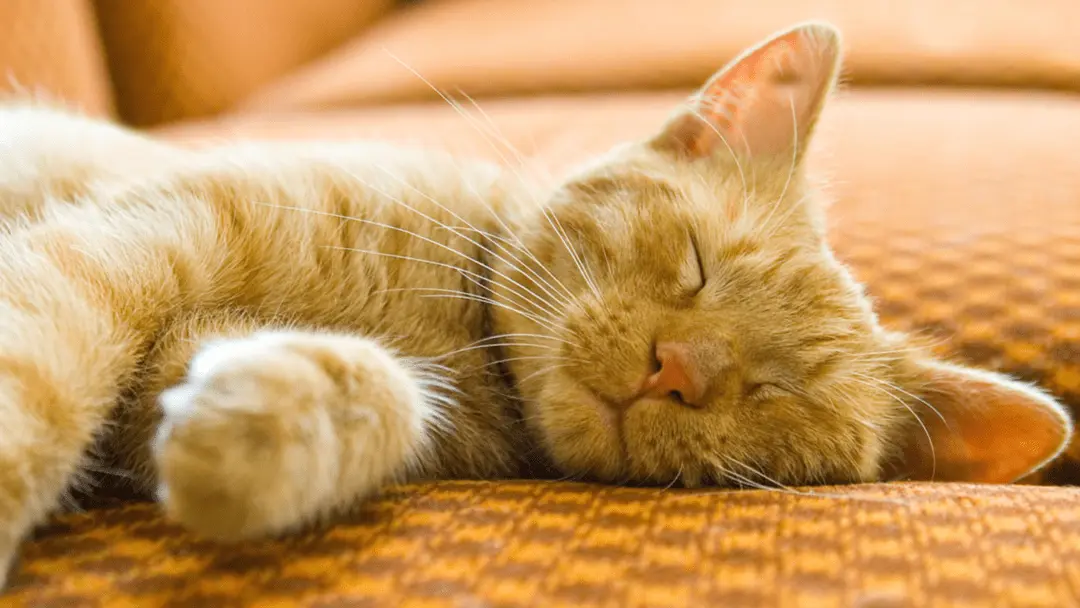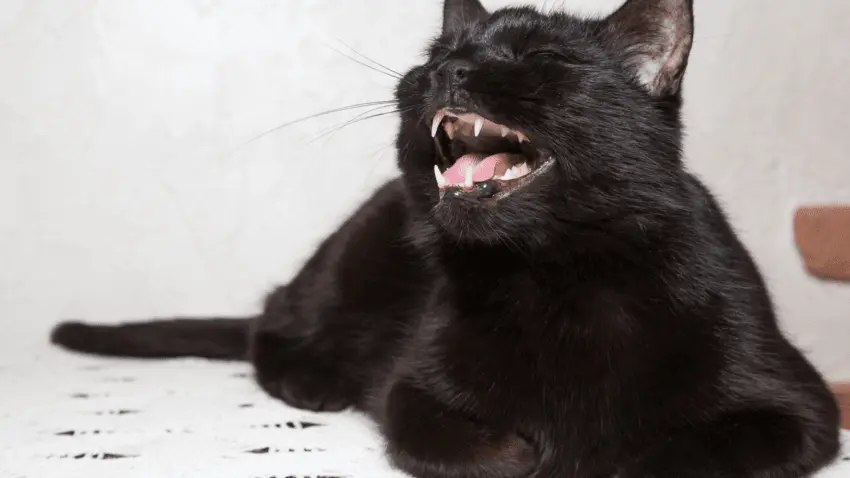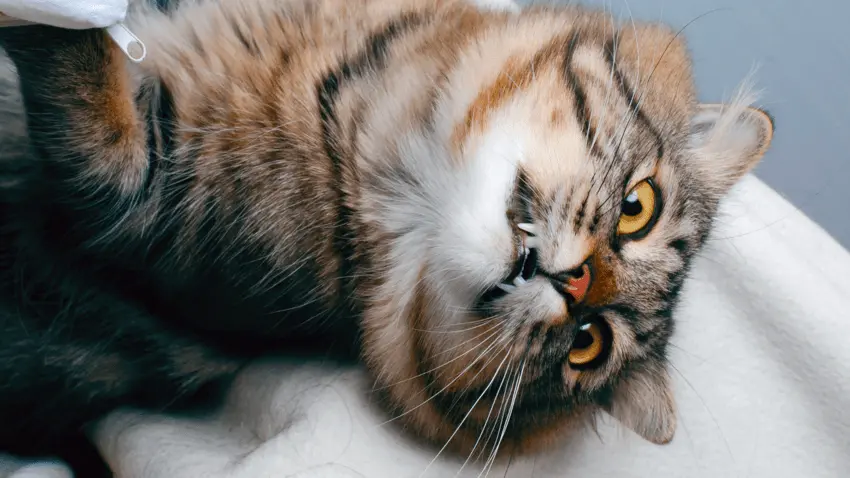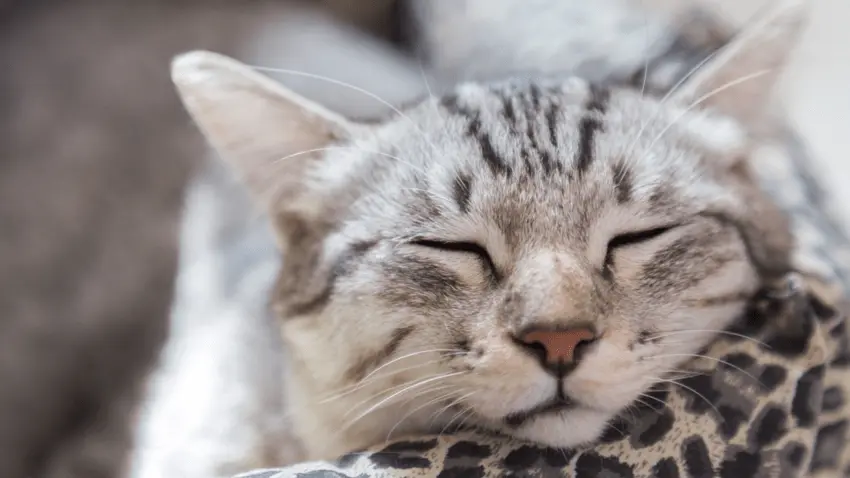Cat Growling in Sleep? Check These 5 Possible Reasons!
Like humans, cats can have vivid dreams, leading to movements and vocalization. This is why a cat growling in sleep isn’t harmful but can surely concern some owners.
As a long-time pet owner, I’ve seen almost every weird thing a cat can do in its sleep. From twitching to growling, our cat Watson has done it in his dreams.

If you’re wondering about the reason behind a cat’s vocalization, I’ve discussed five possible reasons. It’s usually not a cause for concern unless it’s becoming worse over time.
But when in doubt, the vet is always the best person to call. You can also bring your kitty to the vet’s clinic for a routine check in case you’re worried about its sleeping behavior.
Read on and see the most likely culprit behind your cat’s vocalization while asleep.
Why is my cat growling in its sleep?

Is your cat growling at your while in deep slumber? The following might be the reasons why:
Dreaming
The most common reason kitties growl in their sleep is a simple dream. Like us, cats can also have dreams where they might be chasing after prey or fighting an enemy.
These dreams can lead to physical reactions like twitching, growling, and even fake running. Sometimes, your cat may get awakened and even redirect the aggression to someone nearby.
On a more scientific level, cats experience paradoxical sleep cycles. During this phase, cats will lose their muscle tone to prevent them from acting out their dreams.
However, it won’t stop your kitty from vocalizing. It can be accompanied or followed by chattering, hissing, and other sorts of vocalization.
Overall, this is considered normal and harmless, especially true if you have a very active cat. Even laidback breeds can also have intense dreams from to time, which is nothing to worry about.
Snoring
In some cases, the sound may not actually be growling but snoring. In this case, snoring can be due to many possible reasons.
This can happen if your cat has a stuffy nose, respiratory infections, flu, or something stuck inside its nose. So if your kitty suddenly starts snoring loudly, you should have it checked for potential health problems.
Aside from that, a growl-like snore can also indicate that your cat has an allergy. It can be due to pollen, dust, or anything in its environment.
Also, snoring can be due to dental problems, which will only worsen if not treated immediately. And in rare cases, the growling sound kitties make while sleeping can be due to a polyp, abscess, or tumor.
Nevertheless, mild snoring from time to time shouldn’t cause panic. This can happen if your cat sleeps in a strange position that blocks its airway.
Pain
Cats in pain often make a groaning noise, even if they are asleep. This is quite common among old felines due to the pains and aches of their joints.
Aside from that, sick cats will also vocalize while they are asleep. It can disrupt their sleep cycle and even make your kitty grumpy during the day.
If your cat starts growling in its sleep, followed by other symptoms, you should consider bringing it to the vet. These other symptoms include poor appetite, lethargy, sudden aggression, and reluctance to do usual activities.
Seizure
Seizures in felines can look and sound differently. Traditional seizures involve convulsions and contractions but can also manifest in other ways.
For example, your cat’s seizure may appear as if it’s sleeping, growling, and twitching. It can be accompanied by drooling, incontinence, and stiffness.
If you’re concerned about your cat’s growling while sleeping, it’s best to consult the vet. There might be an underlying health problem that needs to be treated right away.
Disturbed sleep
If something bothers your cat and disturbs its sleep, it may growl as a warning to leave him alone. It’s like a person being disturbed during a restful sleep.
Should I wake my growling cat?
For the most part, growling while sleeping isn’t dangerous for cats. You can leave your cat alone and just let it awaken naturally.
Take note that some cats don’t like being disturbed when they are asleep. If the growling becomes stronger when patting your cat awake, take it as a warning and just let it be.
Most of the time, felines will be awakened by their own growling when it becomes too loud. After all, trying to wake a cat in the middle of an aggressive dream can result in nasty scratches or even a bite.
Is it normal for cats to growl in their sleep?
In general, it’s normal for kitties to vocalize and growl in their sleep. Like humans, they also get dreams, which can be too realistic or vivid.
As long as the growling isn’t accompanied by other symptoms, there’s nothing to worry about.
Why did my cat wake up growling?

Sometimes, cats can be awakened by their own vocalizations. Also, the first few seconds of waking up from a deep sleep can be disorienting for felines, thus the growling.
However, if it happens every time, you may want to check for anything that causes stress, fear, or anxiety to your pet.
Also, avoid lifting, touching, or disturbing your cat while it’s asleep. Aside from growling, your pet may react aggressively toward you.
Why did my cat hiss in her sleep?
Hissing in its sleep is a sign that your cat is dreaming. It can also be a warning that something is disturbing your kitty’s sleep, and it wants to be left alone.
Like growling, hissing is a normal reaction of cats when they are upset or threatened. It shouldn’t cause concern unless it occurs suddenly and persistently.
Is my cat having a nightmare?

Felines also experience nightmares as humans do. It’s their way of processing stress, which can be due to an undesirable experience during the day or the distant past.
Aside from that, cats can have nightmares if they are experiencing physical pain.
Nightmares in cats can cause twitching, vocalization, and sudden waking. Despite that, you shouldn’t try to wake your cat as it can lead to an untoward reaction.
The only exception will be if your cat is at risk of being injured. But even then, you must practice caution.
Conclusion
A cat growling in sleep is usually harmless and not a cause of concern among owners. Because, like us, kitties also experience dreaming and even nightmares in some cases.
However, if you find your cat’s growling unusual, it doesn’t hurt to consult the vet. This will help rule out any potential health problems that might be causing its vocalization while asleep.
Overall, you shouldn’t panic when you hear your cat growl on it sleep. Observe and talk to the veterinarian as needed.
